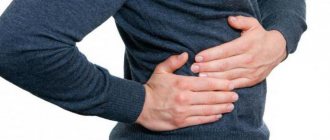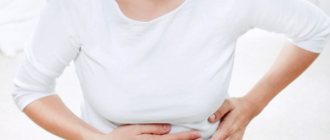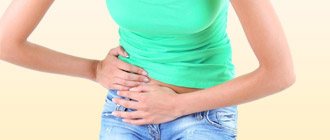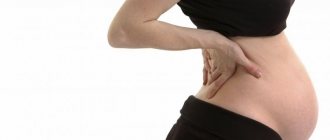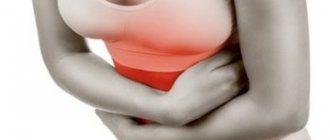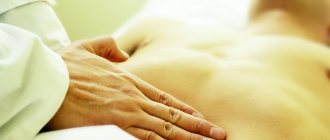Attacks of heartburn and a feeling of heaviness in the stomach can be two completely different symptoms. But still, in the overwhelming majority of cases, both manifestations occur together, which is why the discomfort felt by a person only intensifies. Unfortunately, many people suffer from heartburn and its accompanying manifestations, which is why the issue of combating such ailments is so acute.
To overcome heartburn and at the same time get rid of the severity, it is necessary to understand the causes and consequences of both problems, find out what caused them, what the consequences may be and how to deal with them.
Unpleasant sensations
To eliminate discomfort in the abdomen and esophagus, it is very important to understand the mechanism of development of each of the symptoms discussed, because the fight against them may differ in its principles and range of means used. To complete the picture, let's look at the nature of both symptoms separately.
Heartburn
Heartburn refers to a burning sensation in the chest area, but in fact, the discomfort is caused by burns of the esophagus. This happens due to malfunction of the sphincter located between the esophagus and stomach.
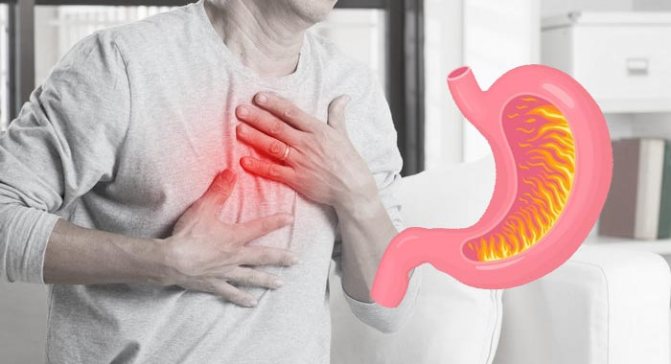
The essence of the problem is that the sphincter does not completely close the lumen allotted to it and food ends up not only in the stomach (uncontrolled reflux may occur in the opposite direction).
Since during such reflux, gastric juice enters the esophagus with the contents of the stomach, the acid contained in it burns the delicate mucous membrane of the esophagus, leading to burns and erosions. This pathology is called reflux. The person then experiences the following symptoms:
- Burning;
- Epigastric pain;
- Uncontrollable belching;
- Nausea or even vomiting;
- Sensation of a lump in the throat.
Heaviness in the stomach
The feeling of heaviness is very different from the feeling people experience from heartburn. This phenomenon does not cause a burning sensation, and it is localized lower - on the left side of the abdominal cavity, in the hypochondrium area.
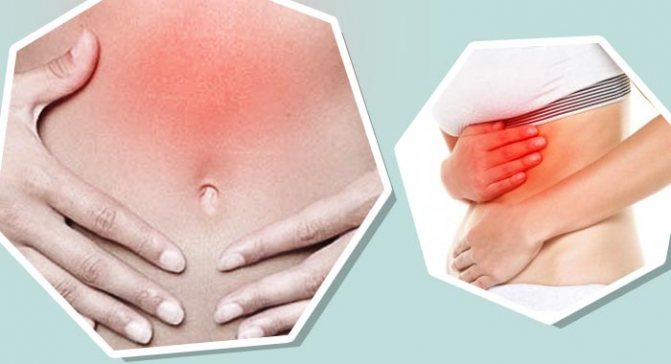
In most cases, this manifestation occurs due to overeating and the inability of the digestive system to cope with excessive load. At the same time, we are faced with the following sensations:
- Drawing manifestations;
- Heaviness;
- Flatulence;
- Seething;
- Nausea;
- Pain;
- Prostration.
What do these phenomena have in common?
The first and most common factor of similarity between heaviness in the stomach and heartburn is that both sensations often come after a hearty meal, such as a feast.
Symptoms may indicate not only an unbalanced diet, but also indicate the presence of any diseases of the gastrointestinal tract. For this reason, the described abnormal feelings cannot be ignored, especially when they become systematic. We need to start studying the causes of their appearance with subsequent treatment.
Stomach pain and diarrhea: causes, what to do, how to treat
Stomach pain and diarrhea are caused by various factors. The disease depends on the frequency and intensity of pain, on their nature. Diarrhea is caused by a lack of essential digestive enzymes in the body.
To determine the diagnosis, patients are referred for tests. We advise you to use the diagnostic services of the private medical clinic “KDS Clinic”. Specialists will conduct an initial consultation and examinations that will help diagnose diseases in the early stages. All examinations are carried out using modern equipment. The clinic's experts are ready to help you at any time.
Symptoms of stomach pain
Severe stomach pain is considered a clear sign that you have problems with the gastrointestinal tract. In addition to diarrhea, patients exhibit accompanying symptoms:
- Gastrointestinal tract disorder.
Many begin to experience diarrhea, and among the people, diarrhea, which indicates indigestion. Diarrhea is caused by various factors. Intestinal upset continues several times a day. If this process lasts more than two days, then the patient begins to develop chronic diarrhea.
Sometimes these symptoms are accompanied by bloody discharge. The patient feels sharp cutting pain in the stomach area.
When an infection affects the body, patients experience an increase in temperature. This indicates a serious infectious pathology
This symptom is caused by gastritis and ulcers. With such diagnoses, the patient feels a cutting pain in the stomach.
- Bad breath.
This symptom indicates liver problems. It is worth introducing plenty of fluids. A nutritionist will prescribe an individual diet for you to stabilize your body.
- Bloating or flatulence indicates disturbances in the gastrointestinal tract.
What else do severe cutting pains in the stomach indicate?
Pain in the stomach indicates a malfunction of the esophagus. Among them: liver disease, hepatitis, cholelithiasis, cholecystitis, inflammation of the gallbladder. If the location of the pain cannot be determined, then the symptoms are associated with neoplasms.
When the first complaints appear, we advise you to contact a gastroenterologist. The doctor will help heal the body as quickly as possible. An accurate diagnosis is established after undergoing examinations and tests. Self-diagnosis at home is impossible.
Causes of abdominal pain and diarrhea
Experts identify a number of main causes that cause abdominal pain and diarrhea.
- Gastrointestinal disorders
In this condition, a person experiences severe pain. To understand all the possible causes, it is necessary to establish the intensity of stomach pain, their frequency and nature. This data will help establish accurate diagnoses and exclude other diseases;
Diarrhea and cutting pain in the stomach are observed on an empty stomach or after eating, and patients also suffer from vomiting and heartburn. Such symptoms indicate gastritis.
If you start this process and do not go to the clinic in time, then gastritis can develop into a duodenal ulcer. Gastritis with low acidity and gastritis with high acidity are classified.
The disease is diagnosed only through tests and diagnostic examinations.
Therefore, to avoid pain and worsening of the condition, contact a medical professional who will prescribe you the correct treatment and select a diet. An endoscopist and gastroenterologist will help establish an accurate diagnosis.
- Duodenal ulcer
This is one of the possible causes of diarrhea, flatulence and stomach pain. This disease appears due to poor diet, consumption of alcohol, fried, fatty and starchy foods. Unpleasant sensations and heartburn during an ulcer occur some time after eating. Pain syndrome occurs no later than an hour and a half after eating.
A cutting pain in the right hypochondrium indicates inflammation of the gallbladder.
Other causes of stomach pain and diarrhea:
With a weakened immune system, a person begins to have problems with the stomach and other body systems. These processes occur most often in spring and autumn, when the immune system is weakened and the body is susceptible to colds and illnesses.
Patients suffer from vitamin deficiency. A patient with a weakened immune system should regularly visit an immunologist. He will prescribe treatment, a suitable diet that will improve the gastrointestinal tract. Patients are prescribed homeopathic treatment. It is effective.
- Excessive exercise
Strong physical activity, overwork and lack of adequate sleep will immediately affect the gastrointestinal tract, complexion and other organs.
- Emotional trauma and stress.
All emotional stress negatively affects the functionality of other organs, and the stomach is no exception. Many people experience upset and diarrhea from stress and anxiety.
The cause of stomach pain is the food itself that you eat. At the first manifestations of pain syndromes, you need to change your menu.
It is necessary to pay attention to the connection between pain and food intake and the nature of the food taken. You should add fruits and vegetables, meat and fish, as well as foods rich in vitamins and minerals to your diet.
You will protect your stomach from diseases and strengthen your entire body.
Diagnosis of stomach pain and diarrhea
An examination is selected individually for each patient. The patient is sent for tests that will show the level of indicators in the body. The patient should give:
- General blood analysis
- Analysis of urine
- Stool analysis
Next, patients are sent for ultrasound diagnostics, computed tomography and MRI. Medical specialists at the private clinic “KDS Clinic” will select treatment for your illness. To make an appointment with a doctor, you can leave an electronic request on our official website or call.
Source: https://kdc.clinic/gastroenterologiya/boli-v-zheludke-i-diareya/
Causes of problems
Heartburn and heaviness in the stomach can have different causes, but understanding them will make it possible to quickly get rid of unpleasant feelings, so it’s worth focusing on this issue in more detail.
Let's look at the probable causes of the occurrence of two symptoms at the same time:
- Poor nutrition – we are talking about the constant consumption of fatty, spicy, fried, smoked and sour foods. Adding a large amount of seasonings and sauces to food. This factor is aggravated by overeating such foods or consuming them shortly before bedtime.
- Obesity - excess weight, especially when it comes to the deposition of fat masses mainly in the abdominal cavity, makes it difficult for organs to function. This leads to their improper functioning, working “to the point of wear and tear”, inadequate digestion of food, disruption of secretory functions and other difficulties. Of course, heartburn and a feeling of heaviness in such situations become almost chronic.
- Improperly distributed physical activity, in particular sports, heavy physical labor immediately after a heavy lunch, or excessive exhaustion of the body is a direct consequence of why a person faces the problems discussed.
- Medicines – be very careful when taking any medications, especially potent ones, even when it comes to treatment. Intolerance to certain medications or their side effects can destroy the microflora of the gastrointestinal tract and cause a lot of problems, including attacks of heartburn and heaviness.
What diseases cause heartburn and heaviness in the stomach?
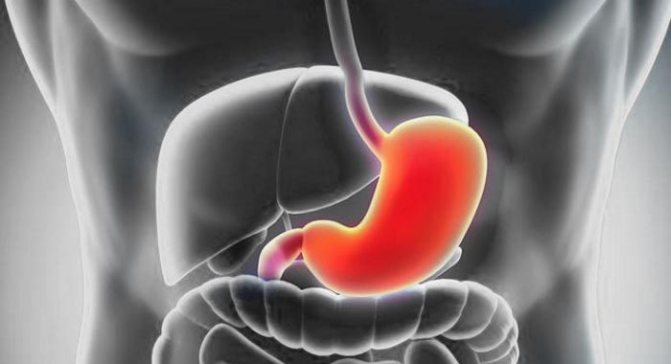
As mentioned earlier, heartburn and heaviness in the stomach are often a consequence of gastrointestinal diseases and signal the onset of the disease or its progression. There are many ailments accompanied by similar symptoms, here are the most common among them:
- Gastritis is a disease characterized by inflammatory processes in the gastric mucosa, indigestion, heartburn, and a feeling of heaviness after eating.
- Peptic ulcer is a pathology associated with a violation of the integrity of the internal covers of the stomach, ulceration of its mucous membrane. This happens due to an imbalance of aggressive substances and protective mechanisms inside the organ, which also causes the symptoms discussed.
- Duodenitis is an inflammatory disease of the duodenum, accompanied by pain, burning in the epigastric region, heaviness and leading to serious dysfunction of the gastrointestinal tract.
- Gastroesophageal reflux disease - causes systematic reflux of gastric contents into the esophagus, is always accompanied by severe heartburn, a feeling of heaviness appears only as it progresses.
- Dyspepsia - this term characterizes precisely the feeling of heaviness, but in general it means the presence of serious problems in the functioning of the digestive system, in which the digestion of food is defective or problematic. Calling this manifestation a disease is not entirely correct; rather, it is a syndrome, but it is imperative to fight it.
This list is not complete, but when it comes to the totality of the manifestations of burning and heaviness in the stomach, when diagnosing, you should pay attention to the above diseases.
Heartburn and pain in the right hypochondrium - causes, treatment
Constant pain in the right hypochondrium is a serious symptom that cannot be ignored for long. It can indicate many serious diseases, including cancer, and determining its cause can be a matter of life and death.
The one on the right...
The liver, gall bladder, part of the large intestine, the right part of the diaphragm, and the lower lobe of the right lung are projected into the right hypochondrium. Diseases or injuries of the listed organs can cause pain on the right side of the peritoneum, the nature and manifestations of which depend on the consequences that arise.
Causes of pain in the hypochondrium on the right, not related to the functioning of the digestive tract, may include:
- right-sided inflammation of the so-called pariental peritoneum, lining the abdominal cavity from the inside;
- preeclampsia (in pregnant women) as a result of generalized vascular damage;
- hemorrhage under the liver capsule, its abscess;
- pneumonia;
- myocardial infarction;
- right-sided pyelonephritis;
- myocardial infarction, right ventricular failure.
Intermittent pain in the right hypochondrium is sometimes a consequence of vegetative-vascular dystonia. A cough combined with pain in the right side may be a sign of right lower lobe pneumonia caused by pneumococci. Currently, her outpatient treatment is possible.
Causes of exacerbations
Pain in the right side can cause sudden exacerbations of chronic diseases, the “trigger” for which are:
- loss of strength associated with decreased immunity;
- overwork, physical and emotional overload;
- changes in the hormonal status of the body (pregnancy, hormonal and radiation therapy, surgery), affecting the qualitative and quantitative production of digestive enzymes;
- seasonal disruptions of the body’s biological “clock” associated with fluctuations in temperature and atmospheric pressure, changes in the length of daylight hours.
During the off-season, you should strictly adhere to the regimen of taking prescribed medications.
Provocateurs of the digestive system
Discomfort and any pain in the right hypochondrium, especially in combination with heartburn, is a clear and characteristic symptom of diseases of the digestive system, such as:
- ulcerative colitis, inflammation of the colon (especially its segment adjacent to the omental bursa), obstruction of the large intestine;
- cholelithiasis, cholecystitis;
- dyskinesia of the bile ducts and spasm of the sphincter of Oddi - the “exit gate” of the biliary tract;
- inflammation or ulcer of the duodenum, stomach;
- inflammation of the pancreas;
- acute appedicitis.
Important! Colitis and appendicitis are characterized by severe pain, which can be localized in various parts of the peritoneum.
Diagnostic aspects for pain in the right hypochondrium
The following are extremely informative for a doctor when making a diagnosis:
- nature of pain (intensity, recurrence, frequency of attacks, duration of episodes);
- its connection with food intake, movement, changes in body position, breathing intensity, time of day;
- nature of the pain (spastic, bursting, pressing);
- information about how the pain is relieved or then weakened;
- what phenomena accompany it (vomiting, heartburn, belching, sweating, fever);
- degree of intensity increase.
For example, a characteristic dull pain with a duodenal ulcer occurs 2-3 hours after eating, at night. Helicobacter pylori infection dramatically increases the likelihood of stomach and duodenal ulcers.
find me
A number of diseases are determined by the location of acute pain and a number of other symptoms:
| Radiation of pain under the right rib | Alleged cause |
| In the neck, right shoulder with transition to the collarbone, right eyelid and brow ridge | Exacerbation of cholecystitis, hepatic colic |
| In the lower third of the abdomen | Acute appendicitis, gynecological pain |
| Acute twisting pain of uncertain localization, subsiding after defecation, loose stools | Irritable bowel syndrome |
| Liquid bloody stools coupled with acute pain throughout the peritoneum | Ulcerative colitis, Crohn's disease |
| Dull pain radiating to the back | Chronic course of cholecystitis, pyelonephritis, urolithiasis |
The causes of unbearable severe pain that require immediate medical attention are:
- gallbladder rupture;
- rupture of the fallopian tube or ovarian cyst;
- acute pyelonephritis;
- opisthorchiasis;
- hepatic colic.
In such situations, it is necessary to stay with the patient until the ambulance arrives.
Starring
Signs of liver pathology with unclear pain in the right hypochondrium:
- their obvious connection with dietary disorders (primarily the consumption of fatty foods);
- characteristic irradiation of pain;
- itching of the skin in a limited area;
- weakness and fatigue, bitterness in the mouth;
- yellow coating on the tongue, dark urine, light-colored stool;
- heartburn and bitter belching.
The liver filters the blood, being in the path of its flow, from toxic metabolic products, toxins formed in the body, foreign substances coming from the digestive tract along its entire length.
The liver continuously produces bile, without which digestion and absorption of nutrients would be impossible. That is why the slightest interruptions in the production of bile or its timely entry into the duodenum have enormous consequences for the functioning of the gastrointestinal tract.
Along with the spleen and bone marrow, the liver is involved in the body's immune responses.
All this determines the enormous importance of the liver both under physiological conditions and in liver pathologies of an inflammatory (hepatitis) and dystrophic (hepatosis) nature.
Bile factor
Bile has bactericidal properties and is a powerful catalyst for pancreatic enzymes. Changes in its composition and (or) quantity radically affect the intensity and quality of digestion.
The main bile duct and the pancreatic duct open at almost the same point in the duodenum. Therefore, when a stone blocks the bile duct, inflammation of the pancreas develops up to pancreatic necrosis. Not only pain in the liver area appears, but also sharp girdling pains characteristic of acute pancreatitis.
Causes of "rockfall"
The normal formation and secretion of bile is determined by many factors that are in a complex relationship. Violation of their balance leads to pathologies of bile formation and bile secretion.
Pathological changes in liver tissue, disorders of general metabolism (metabolism) change the composition of the secreted bile.
The result of this is the release of cholesterol under chemical conditions that prevent it from being retained in solution (bile).
A decrease in the ability of cholesterol to form a solution leads to the formation of a cholesterol precipitate, which becomes the basis of the so-called cholesterol stones.
The second cause of stone formation is stagnation of bile - a complete stop for various reasons in its flow through the bile ducts, the so-called stasis.
The third reason is infections and inflammation in the mucous membranes of the ducts (angiocholitis) and bladder (cholecystitis).
The bile ducts are sometimes infected from below in case of bile stagnation, and sometimes from the side of the intrahepatic ducts (from above).
In a viscous, supersaturated solution, exfoliated pieces of epithelium, inflammation products, and fibrin fragments become centers of crystallization, around which stones begin to form.
Pathological processes that develop secondarily after the formation of stones only complicate the situation.
Consequences of the “rockfall”
The formation of stones is provoked by rare meals and stagnation in the biliary system. Prevention of bile stagnation - eating at least 5 times a day, consuming foods rich in dietary fiber.
Sometimes the presence of stones does not cause any significant symptoms, but stone formation in most cases has dangerous, far-reaching consequences, and they are as follows:
- attacks of stabbing pain with characteristic irradiation (in combination with cholecystitis) as a result of spastic contractions of the biliary tract, so-called colic;
- temperature increase;
- complete blockage of the ducts.
Paroxysmal severe pain occurs in diseases of the biliary tract as a result of a violation of the outflow of bile and an increase in pressure in their lumen.
Pinching of a stone in the neck of the bladder makes the pain unbearable.
Blockage of the bile ducts causes jaundice, which may appear or disappear depending on how the stone is oriented, what its shape is and how much it blocks the lumen of the bile duct.
Jaundice
An obstacle to the flow of bile can be created not only by a stone, but also by sharply condensed bile, a tumor compressing the duct, and an inflammatory process developing in the duodenum. The ducts located above such a plug become filled with bile and stretch.
Due to their proximity to the lymphatic vessels, absorption begins in the bile into the lymphatic system and then into the bloodstream. Bile pigments that enter the blood are deposited in the skin, coloring the mucous membranes, sclera and, to one degree or another, all internal organs.
This type of jaundice is called mechanical jaundice.
The occurrence of jaundice is not always associated with blockage of the duct. A passing stone can injure the bile ducts. As a result, the infection located in them, which previously did not manifest itself in any way (latent), spreads and leads to pathological changes in liver tissue and the development of so-called hepatic jaundice.
Liver pathologies are sometimes not accompanied by jaundice and severe pain - this is their insidiousness and the main danger.
Heartburn as a consequence of liver pathologies
Heartburn is a sudden release of liquid food gruel back into the esophagus. This phenomenon is called reflux and becomes possible when the pressure in the stomach cavity becomes higher than in the esophageal tube. A burning sensation occurs when the esophageal mucosa is irritated, and prolonged irritation increases both pain and the degree of trauma to the esophagus, up to ulceration.
Violations of the biliary function of the liver cause a general disorder of gastric and intestinal digestion due to a deficiency of bile at the time food enters the duodenum.
Food mass accumulates in the small intestine, causing its overload, intoxication, fermentation and putrefaction processes, accompanied by the separation of gases and an increase in pressure inside the peritoneum.
The overcrowded intestines begin to “prop up” the stomach from below, changing its position and unclenching the valve through which food enters.
Congestion in the stomach and small intestine, coupled with increased peritoneal pressure, leads to the reverse movement of first accumulated gases (gas reflux or belching), and then liquid contents, causing heartburn.
Pain in the liver in combination with heartburn indicates persistent disturbances in the motility of the upper gastrointestinal tract and pathologies of bile secretion. The nature of these pains and accompanying symptoms, coupled with a clinical examination, will allow an accurate diagnosis and a therapeutic approach to be determined.
Source: https://izjoga.info/izzhoga/prichiny/bol-v-pravom-podrebere.html
Diagnostics
Heaviness in the stomach, accompanied by heartburn, as you have already seen, can be the cause of a serious illness or disorder of the gastrointestinal tract. Do not ignore such symptoms, get diagnosed and first of all undergo the following examinations:
- A visit to a gastroenterologist with a detailed description of complaints, frequency of manifestations, general symptoms to collect anamnesis.
- Blood biochemistry is a laboratory diagnostic method that allows the doctor to judge the performance of internal organs. In our case, it is mainly the pancreas, liver and gall bladder; it is their condition that is of greatest interest in case of heartburn and severity.
- Ultrasound examination of the abdominal cavity - allows you to identify abnormalities in the structure of internal organs, detect neoplasms or severe inflammatory processes.
- FEGDS is the most effective method for establishing and accurately identifying problems associated with the work and internal state of the esophagus, stomach, duodenum and sphincters located in these sections. Fibroesophagogastroduodenoscopy is carried out only on an empty stomach ; it allows the diagnostician, using special equipment, to visually assess the condition of the organs, take samples of gastric juice for analysis, and, if necessary, internal tissues.
Treatment
The times when people were confident in the correctness of three meals a day and large meals are gone. Today, when most of the world's population suffers from various diseases of the gastrointestinal tract and digestive system, doctors are confident that it is necessary to eat 4-5 times a day, in small portions.
In addition, to prevent diseases and avoid the symptoms we are discussing, you should minimize the consumption of fatty, fried, smoked, sour and spicy foods. You can eat such dishes, but you shouldn’t abuse them. It is better to give preference to lighter foods that are easier to digest and easier to absorb by the body.
Regarding your diet, try to have a full breakfast, limit your exposure to fast food, and also avoid late dinners. If you suffer from heartburn and a feeling of heaviness, the interval between food and sleep should be at least 2 hours, and dinner should be light.
As for treatment, the main criterion for recovery will be victory over the underlying disease , which provokes discomfort and burning sensations in the chest area. But in the first stages of treatment it will not be possible to get rid of pathological manifestations, so they need to be stopped:
- To quickly eliminate heartburn and the damage it causes, keep antacids with you. This remedy not only neutralizes the corrosive effect of gastric juice, but also soothes and envelops the damaged mucosa. It is better to take this medication in liquid or gel form, the effect will be faster and more effective.
- As for heaviness, as already mentioned, it occurs due to the body’s inability to digest what is eaten. To simplify this task, you can take an enzyme preparation that enhances digestion and promotes the breakdown of proteins and fats, for example, Mezim.
Otherwise, try to take manifestations of this nature seriously; you should not self-medicate, and even more so you should not ignore either the heartburn or the feeling of heaviness that constantly haunts you. Consult a doctor as soon as possible and start treatment, take care of your health, and do not aggravate the situation.
